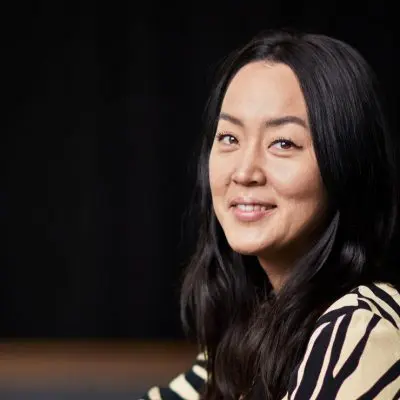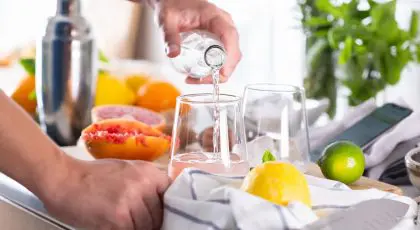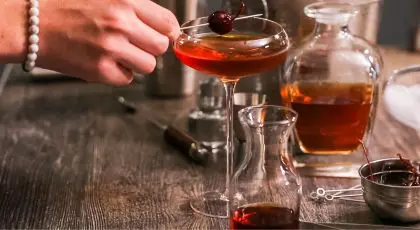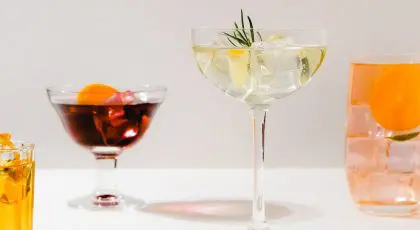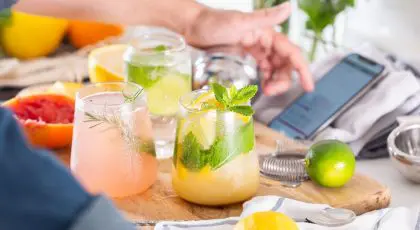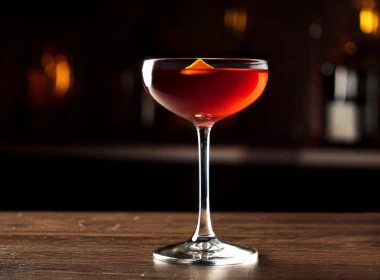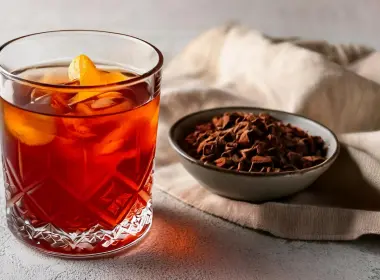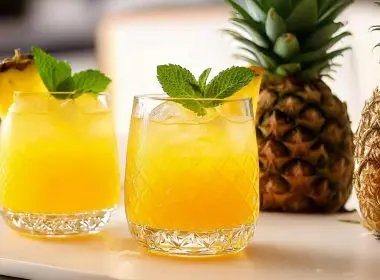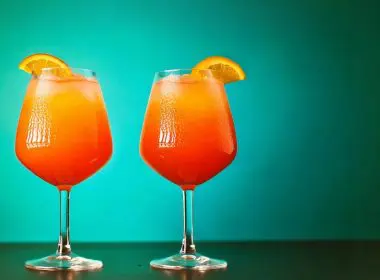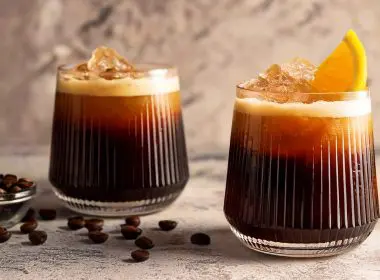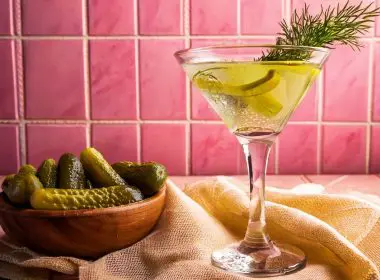The Perfect Mix: Monica Berg
Jump to:
Have you ever wondered what the world’s best bartender lists as her favorite cocktails? What bar equipment she simply can’t live without? How she manages to keep coming up with brilliant new drink ideas? What trends she’s excited about, or what she’d do to change the bar industry? The Mixer spoke to multi-award-winning bartender Monica Berg to find out.
Monica Berg is a bartender, innovator, and entrepreneur. With her partner Alex Kratena, she owns Tayēr + Elementary in London’s Old Street, which currently holds the number 2 position in The World’s Best Bars List. Tayēr + Elementary is a venue of two halves. The name Tayēr is derived from the Spanish word taller, which means workshop, and is a space for innovative new concoctions. Elementary is your neighborhood bar serving classic cocktails made from seasonal ingredients.
Berg is also the Creative Director of Campari Academy, an international educational platform for bartenders, and is the co-founder of the non-profit bartending symposium P(our). In 2019 she won the Altos Bartenders’ Bartender Award at The World’s 50 Best Bars, and in the same year, established Back of House, a platform for hospitality workers to anonymously report harassment and discrimination. She spoke to The Mixer about her life in cocktails and much, much more.
The Mixer: The Mixer is all about togetherness. What is it about cocktails that bring people together?
Monica Berg: I think it’s less about cocktails and more about the surroundings. The lockdown was a very good example of that, in the sense that restaurants are places where you go to celebrate something, or go with people that you already know. Cocktails or drinks are enjoyed in a bar, and it’s about meeting people you don’t know or getting to know people you don’t know well. Drinking is essentially part of our social/cultural heritage. So, when you look at drinks as an expression of the wider society, it becomes a much more meaningful conversation. Cocktails are about being social, about being around people, and it’s essentially an extension of who we are.
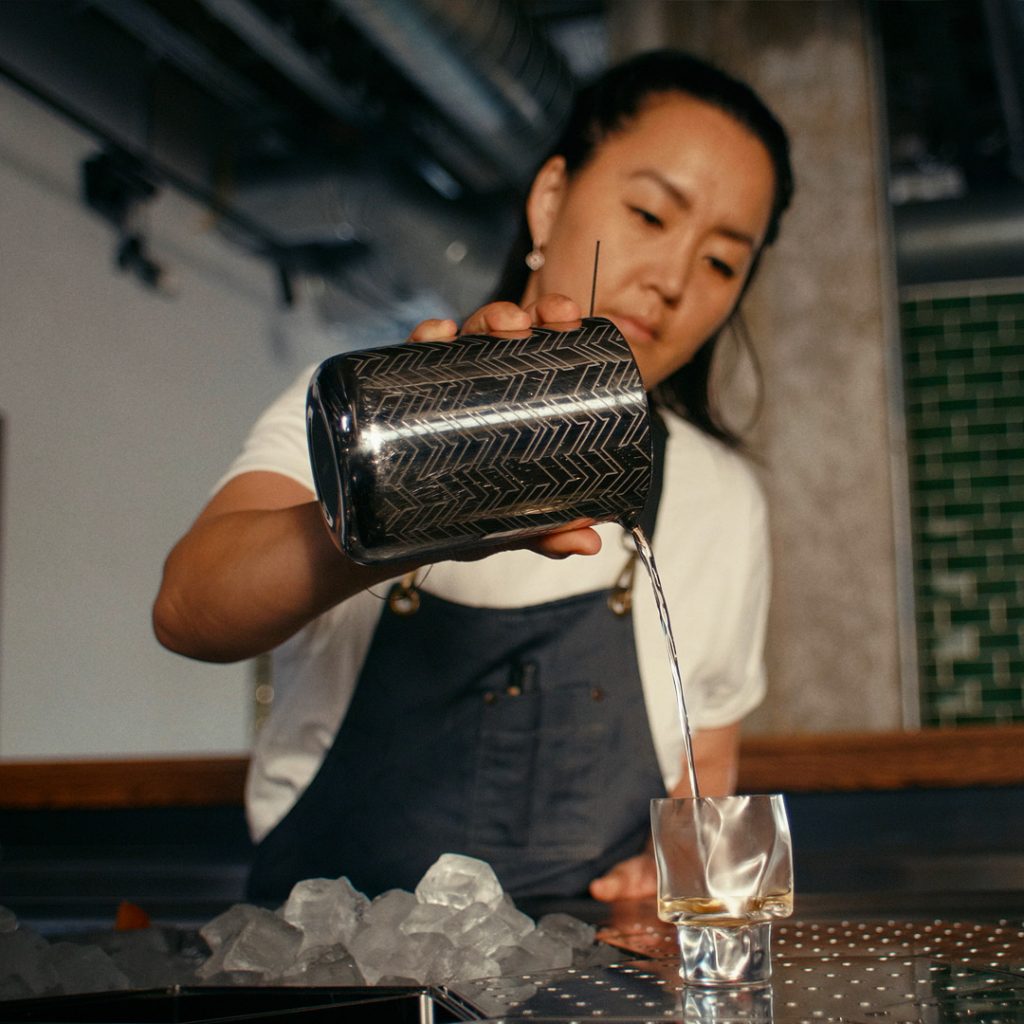
TM: You have a concept at Tayēr + Elementary that you wouldn’t serve a drink that you wouldn’t serve to your own mother. What does that mean to you?
MB: Well, we say this, but we also say that it’s only accurate if you like your mother. And if you don’t, replace that with someone very important to you in your life. For us, it means that if it’s not good enough for your mother (or the most important person in your life), then why would it be good enough for someone else? For example, if you accidentally drop an orange garnish on the floor, would you pick it up and put it in the glass if you’re going to serve your mother? No, you wouldn’t. So why would you do that to anyone else? You always have a choice to do the very best you can in any situation, and that’s the standard we always aim for.
TM: You’ve also said that Tayēr + Elementary want to show that food and cocktails don’t need to be made from exclusive ingredients. Is accessibility important to you as a cocktail maker?
MB: Absolutely. In any industry or field, you always have that 3 – 5% that have a very specialized interest in food and drinks – in science, technology, art, literature—anything. But I think that one of the things that we as an industry need to do is to make cocktails, drinks, and bars accessible and approachable to anyone. Taking familiar things and showcasing them in a way that may be a little bit different. For example, a Whiskey Sour. Not everyone will know what a Whiskey Sour is, so at Tayēr + Elementary we make a Cherry Whiskey Sour. Some people will recognize the Whiskey Sour part, some will recognize what a cherry is, and some won’t necessarily understand anything but will want to try it. It’s about lowering the thresholds of drinking so that it is not scary to anyone. My mom, for example, will never go into a bar and order a drink because she is terrified of ordering the wrong thing or not pronouncing it right. So, instead of ordering a cocktail, she would just order a glass of white wine. And this is what many people do, but there is nothing wrong with asking questions because there are certain things you can’t know about until you’ve experienced them. If you’ve never tasted a Whiskey Sour, how will you know if you like it? As professionals, we should always try to make it as easy as possible for as many people as possible to come and enjoy a drink.
TM: Do you have any tips for someone that is looking to start making cocktails, and how they can take their first steps?
MB: I would say you should approach cocktails in the same way as you do food. Don’t be scared. I know that for many, the entry-level financial commitment is sometimes higher than when cooking a dish at home, but the rules are the same. Firstly, make sure you get the best ingredients and invest in the right tools. You must read and do a little research. What might be delicious for one person might not be for someone else. You can read all the articles you like about what is more trendy or popular right now, but at the end of the day, that will never replace your instinct. So, if you like whiskey, then drink whiskey. If you like rum, then drink rum. There will always be something else that is more in fashion, but very few things that are right or wrong.
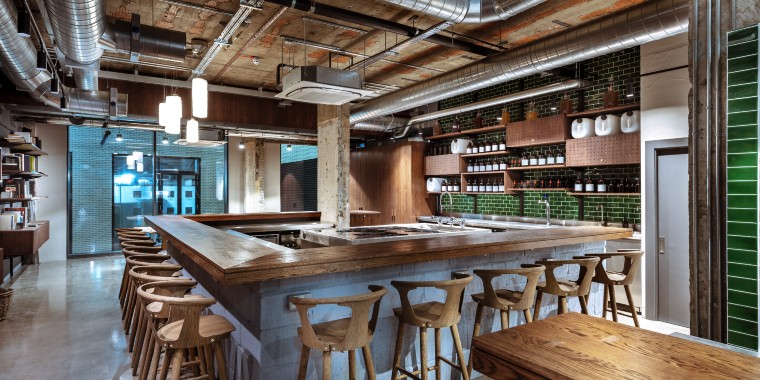
TM: What bar equipment and ingredients are essential in making good cocktails?
MB: The jigger because ratios are the most important thing in cocktail making. If you can keep the ratio between ingredients, you can make pretty much whatever you want. After that, the most important ingredient to make cocktails is good ice.
TM: Inclusivity and diversity are subjects that you’ve written about. Why, why are these issues close to your heart?
MB: In 2023, there’s no point saying that inclusivity and diversity are not important. We all know they are. But the problem is that topics like these can be very sensitive and scary to address. While many people and businesses focus on diversity, they must remember that it needs to come with inclusivity. It doesn’t matter if you put a diverse group of people into a room if you don’t take into consideration that different people have different needs, wants, and starting points. We also need to ensure that once we get all these people in the same room, we support them to flourish at their own speed. It’s an important topic for me because it will help the whole bar industry. In my personal life, I’ve been on both sides of the coin – on one side, where I feel like I was very privileged in how and where I grew up. On the other side, I have had disadvantages because of other things. So, I want to make sure that as I progress in my career I can use that privilege to open doors for others.
Representation also matters. One of the biggest mistakes of any leader in any industry is that they try to hire the qualities that they see in themselves. Because if they hire people that look like them, think like them and speak like them, they’re more likely to agree with them. But differences in opinion allow you to look at things from all angles and find a golden middle ground.
TM: We thought it was really interesting that you said you were 10 years into your career until you were referred to as a female bartender rather than a bartender…
MB: It’s a weird one. For the first 10 years of my life, I was just a bartender. It was only when I started to get more recognition that someone decided that I was a female bartender. So, when people ask me, “How does it feel to be a female bartender?” I don’t really know, because I’ve never been anything else. In the same way, a few years ago, someone referred to me “as a woman of color,” and I hadn’t thought of myself as that. I’m the most Norwegian person and very much a product of where I grew up. And yes, I also am adopted; I was born in Seoul. And obviously I realize that every time I look in the mirror, but I didn’t give myself that label. Someone else did. But then I had to think, “ok, now, I have to take this into consideration as well.” I know it’s a human need to categorize people in compartments, but the word ‘bartender’ is not gendered. You don’t have to be a woman or a man. You don’t have to be anything. How you self-identify is entirely up to you. Anyone can be a bartender.
When people ask me and my partner Alex to come to events, we only will do that if they make an effort to be inclusive. I don’t want to be the only woman. I don’t want to be the only anything. Organizers will reply that it’s difficult to find diverse representatives, but they are out there; you just need to try a little bit harder. Nobody said it would be easy, but it doesn’t make it any less important.
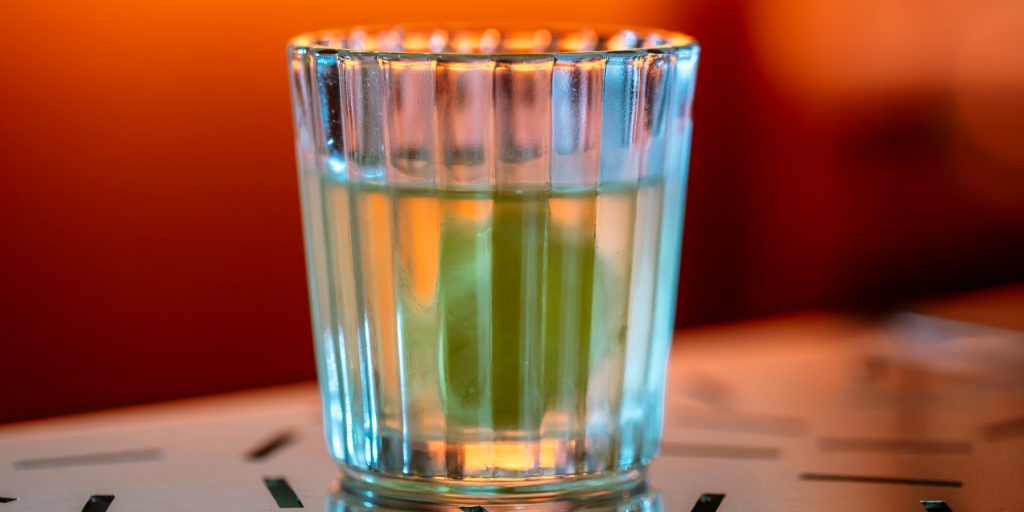
TM: At Tayēr + Elementary you try to be as sustainable as possible. Do you think waste reduction and sustainability is a big concern in the bar industry at the moment?
MB: It’s definitely a mindset. Like so many other industries, the hospitality industry has probably focused more on the environmental part of sustainability. However, in the last two years, it became more focused on human and financial sustainability and how all these pillars of sustainability work together.
In terms of environmental sustainability, there’s a lot more focus on the front-end of supply chain sourcing, including getting the best seasonal produce, and being more conscious about where and to who your money goes. And then on the back-end, trying to reduce the waste. There will always be a lot of waste in the food and drink industry. When you look at the numbers, almost 50% of produce and livestock ends up as waste—often for very superficial reasons.
When you put that up against the fact that people are starving in every layer of society, and on the opposite side, vegetables and fruits are thrown out because it doesn’t look picture perfect, it just doesn’t make sense.
At Tayēr + Elementary, we reuse our ingredients until they are completely exhausted. And when they are exhausted from the bar point of view, we will pass them on to the kitchen. We often just need the liquid side of an ingredient. So, for example, we will use an ingredient like rhubarb, so we will use our rhubarb two or three times to make cocktails. And then, when we have most of the flavor extracted, we’ll pass on the solid to the kitchen because they can then still incorporate it into a purée. So, nothing goes to waste.
We also work with a lot of spirit brands, where we buy in bulk 25-liter containers directly from the distillery, so we don’t have to have all of the glass bottles because it’s just waste. Instead of having the blue roll in the bar, we have reusable linen clothes. So, we try to minimize waste in every single department or every single interaction so that we can do our little bit.
TM: At Tayēr you feature new cocktails all the time. How do you stay inspired and how do you feed your creativity?
MB: At Tayēr, the menu changes every day, not entirely, but something will change. And it may vary based on hyper-seasonality, but also the vibe of the moment. I always explore things that interest me beyond the bar industry. If you only read about ingredients, fermentation, and pickling, you will hit a wall because it’s too one-dimensional. I get inspiration from everything: I can walk on the street and smell perfume or the earthy greenness of the park in spring and think, “this would be nice to drink”. Sometimes it’s about going to restaurants, experiencing a meal and getting flavor combinations that you wouldn’t necessarily think about. I’m also very, very into perfume and read a lot of perfume books about the science and chemistry behind fragrance compositions.
Traveling, meeting people, and seeing things that you never seen before all inspire me—though sometimes they don’t come to the fore until years later. My mind also works in hyperdrive, and I have 1000 thoughts at the same time. And then I want to make the thoughts into a cocktail. When I’m stressed or under a lot of pressure, I make very, very good drinks. Because I just need to cleanse my mind. And, for me, it’s the way to transfer my mind. When I have a lot on my mind and I make a drink, you can see it in the drink. It’s like an extension of my brain.
TM: Are there any upcoming trends that you can see in the cocktail and bartending industry that you’re excited about?
MB: One of the things that I’m really excited about is that you can start to see much more individuality. There used to be this single-minded way of thinking about bars, drinks, and bartenders. Something I have worked on in the last decade is encouraging bartenders to express themselves, their heritage, traditions, and flavors through their drinks. When I go to Tokyo, I want to taste that I’m in Tokyo; I don’t want to taste like I’m in Manhattan or London. Bars are becoming less cookie-cutter. A bar doesn’t have to be dark with jazz music. A bar can be whatever it wants to be. A lot of places are focusing more on being less serious and are being more playful. As long as the cocktails are delicious. That’s the only rule you should strive to abide by.
At Tayēr, we have entirely removed ourselves from the classic way of composing cocktails. The first thing we do when we get a seasonal ingredient is taste it and discuss what we want to do, because fruit can be very different at the beginning of the season from how it is at the end. There are multiple ways of getting the flavors where you want them to be, and it’s more about expressing the uniqueness of the ingredient.
I’m also seeing that people are going back to making bars and restaurants their second home. At Tayēr + Elementary, we have a lot of regulars, and it’s about having that human connection.
One of the big trends coming up is in ready-to-drink cocktails. We have our own at Tayēr + Elementary. So obviously, I’m slightly biased, but I think this is the right way of having convenience, rather than having the convenience of strawberries all year round, because it’s not going to taste like a strawberry all year. But, with the right knowledge, equipment, and understanding, you could have cocktails made with strawberries that will last a year. It’s exciting because it will open up drinks and cocktails to a different audience and help them enjoy good quality cocktails, everywhere.
TM: Finally, what are your three favorite classic cocktails?
MB: I’m a very boring person, I always drink the same. My go to drink is a Gin Martini. Then I would say, a Negroni but made with an agave spirit rather than gin. Finally, a Sherry Cobbler.
